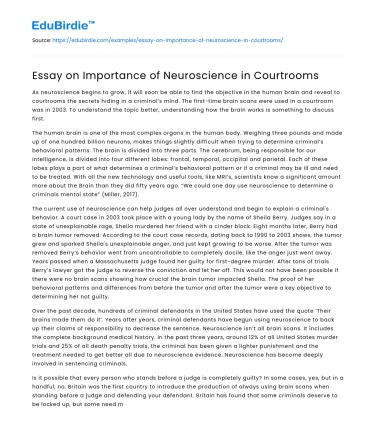As neuroscience begins to grow, it will soon be able to find the objective in the human brain and reveal to courtrooms the secrets hiding in a criminal’s mind. The first-time brain scans were used in a courtroom was in 2003. To understand the topic better, understanding how the brain works is something to discuss first.
The human brain is one of the most complex organs in the human body. Weighing three pounds and made up of one hundred billion neurons, makes things slightly difficult when trying to determine criminal’s behavioral patterns. The brain is divided into three parts. The cerebrum, being responsible for our intelligence, is divided into four different lobes: frontal, temporal, occipital and parietal. Each of these lobes plays a part of what determines a criminal’s behavioral pattern or if a criminal may be ill and need to be treated. With all the new technology and useful tools, like MRI’s, scientists know a significant amount more about the Brain than they did fifty years ago. “We could one day use neuroscience to determine a criminals mental state” (Miller, 2017).
Save your time!
We can take care of your essay
- Proper editing and formatting
- Free revision, title page, and bibliography
- Flexible prices and money-back guarantee
The current use of neuroscience can help judges all over understand and begin to explain a criminal's behavior. A court case in 2003 took place with a young lady by the name of Sheila Berry. Judges say in a state of unexplainable rage, Sheila murdered her friend with a cinder block. Eight months later, Berry had a brain tumor removed. According to the court case records, dating back to 1990 to 2003 shows, the tumor grew and sparked Sheila's unexplainable anger, and just kept growing to be worse. After the tumor was removed Berry’s behavior went from uncontrollable to completely docile, like the anger just went away. Years passed when a Massachusetts judge found her guilty for first-degree murder. After tons of trials Berry’s lawyer got the judge to reverse the conviction and let her off. This would not have been possible if there were no brain scans showing how crucial the brain tumor impacted Sheila. The proof of her behavioral patterns and differences from before the tumor and after the tumor were a key objective to determining her not guilty.
Over the past decade, hundreds of criminal defendants in the United States have used the quote ‘Their brains made them do it’. Years after years, criminal defendants have begun using neuroscience to back up their claims of responsibility to decrease the sentence. Neuroscience isn’t all brain scans. It includes the complete background medical history. In the past three years, around 12% of all United States murder trials and 25% of all death penalty trials, the criminal has been given a lighter punishment and the treatment needed to get better all due to neuroscience evidence. Neuroscience has become deeply involved in sentencing criminals.
Is it possible that every person who stands before a judge is completely guilty? In some cases, yes, but in a handful, no. Britain was the first country to introduce the production of always using brain scans when standing before a judge and defending your defendant. Britain has found that some criminals deserve to be locked up, but some need mental help and could use this as an opportunity to treat the ill instead of possibly serving a death penalty. From 2011-2015 they have had a 6% success rate getting the judge to reverse the convict and 20% have gained an extra hearing, lessened their sentence, a reversal, or bought themselves some time.
The importance neuroscience brings to a courtroom is brain scans are something you can’t ‘make up’. It’s hard to disaggregate.






 Stuck on your essay?
Stuck on your essay?

